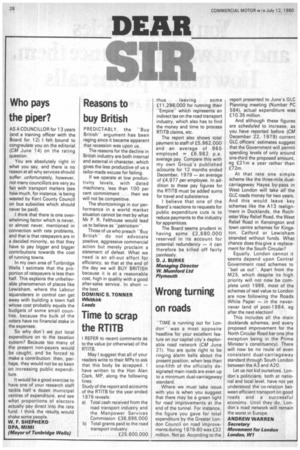Who pays the piper?
Page 30

If you've noticed an error in this article please click here to report it so we can fix it.
AS A COUNCILLOR for 13 years (and a training officer with the Board for 12) I felt bound to congraulate you on the editorial (CM June 14) on the rating question.
You are absolutely right in what you say, and there is no reason at all why services should suffer: unfortunately, however, not many councillors are very au fait with transport matters (see how much, for instance, is being wasted by Kent County Council on bus subsidies which should never be paid).
I think that there is one overwhelming factor which is never, or almost never, mentioned in connection with rate problems, and that is that ratepayers are in a decided minority, so that they have to pay bigger and bigger contributions towards the cost of running towns.
In my own area of Tunbridge Wells I estimate that the proportion of ratepayers is less than half. This explains the unbelievable phenomenon of places like Lewisham, where the Labour squanderers in control can get away with building a town hall whose cost probably equals the budgets of some small counties, because the bulk of the voters have no financial stake in the expenses.
So why don't we put local expenditure on to the taxation system? Because too many of the present non-payers would be caught, and be forced to make a contribution: then, perhaps, they would not be so keen on increasing public expenditure.
It would be a good exercise to have one of your research staff tackle half -a dozen municipal centres of expenditure, and see what proportions of electors actually pay direct into the rate fund. I think the results would shake some people.
W. F. SHEPHERD DPA, MIMI (Mayor of Tunbridge Wells)












































































































































